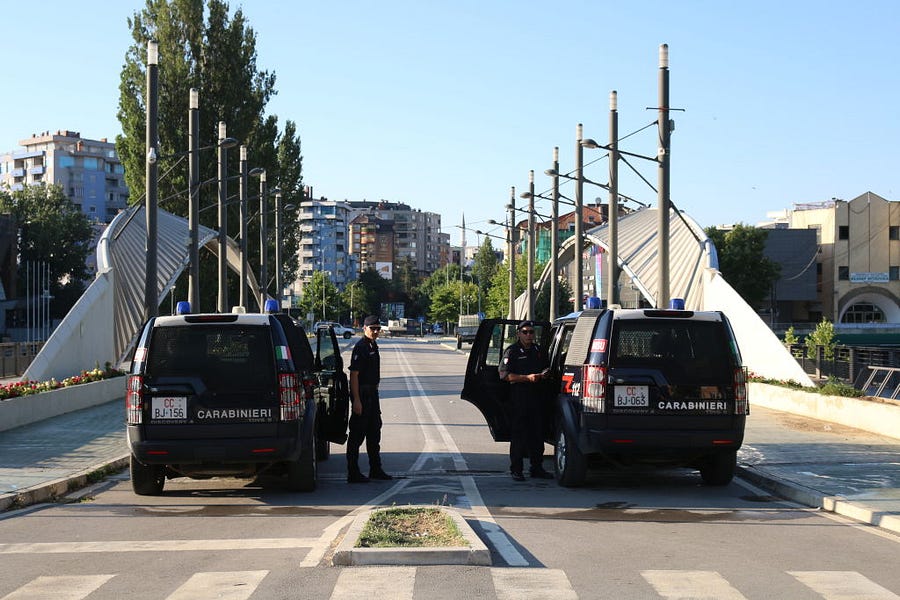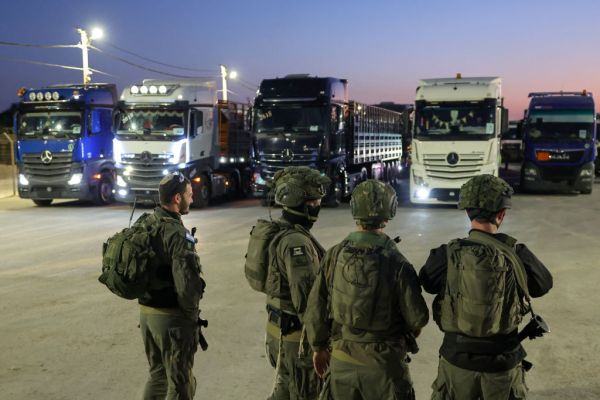Should Americans care about a dispute between Serbs and Albanians over vehicle license plates in northern Kosovo? Actually, they should. What seems like a petty car tag issue risks escalating into a major source of instability in Europe, actively fomented by Vladimir Putin’s regime.
At the heart of the ongoing quarrel lies Serbia’s refusal to recognize Kosovo’s 14-year-old institutions as legitimate. As a result, when Kosovo’s government started requiring its Serbian residents to switch their (Serbian) license plates to Kosovar ones last year, they were incensed.
Kosovo backtracked but sought to introduce the policy again this summer, alongside a system of entry permits for visitors from Serbia (a border arrangement that Serbia agreed to in 2011 and has in fact enforced on Kosovo nationals traveling to Serbia). Serbian-installed roadblocks suddenly appeared, and there were reports of violence and gunfire. Things seemingly calmed down after Pristina extended the deadline for replacing the tags until September 1. On Wednesday, NATO Secretary General Jens Stoltenberg stated that the alliance was ready to beef up its peacekeeping force in the country, currently at about 3,600 troops, and intervene if the situation worsens.
Unsurprisingly, the talks held on Thursday between Serbian President Aleksandar Vučić and Kosovar Prime Minister Albin Kurti brought no breakthroughs. For one, while the unresolved situation in Kosovo is a hindrance to Serbia’s efforts to join the European Union (EU), where it enjoys the status of a candidate country, for Vučić, it is also a convenient tool of political mobilization.
More importantly for Vučić’s sponsor, the Kremlin, Kosovo is yet another pressure point that can be used to throw Europeans off balance. In 2016 in Montenegro, Russia organized a failed coup d’état. In Macedonia, it sought to disrupt the 2018 referendum on the country’s NATO membership. Serbia is among the top customers of Russia’s defense industry, and Vučić’s project of a “Serbian world” is essentially a copy of the idea of a “Russkiy Mir,” aiming to unite all Serbian speakers under Belgrade’s political control. Weeks before Russia’s invasion of Ukraine, Serbia and Russia made a public pledge to jointly combat “color revolutions.”
As a result, there are eerie parallels between the imperial attitude of Beijing toward Taiwan (not a sovereign state but supposedly part of “one China”), Russia’s attitude toward ex-Soviet republics (“artificial states”), and Belgrade’s view of Kosovo. The ethnic Albanian majority of the former autonomous province within Serbia was repressed throughout much of the former Yugoslavia’s existence. As Yugoslavia disintegrated in the 1990s, Serbian brutality intensified, prompting an armed Kosovar insurrection and a genocidal response from the Serbs, using both regular and paramilitary forces. More than 13,000 people died during the two-year war and more than 1 million Kosovo Albanians were displaced.
Since Kosovo declared independence in 2008, still under NATO’s protection, Serbia has used every opportunity to weaken the country, much like it has done in Bosnia. The prospect of Republika Srpska’s secession and absorption into Serbia hangs as a constant threat over the heads of Bosniaks and Bosnian Croats. Through these efforts, Serbs have benefitted from the Kremlin’s assistance. Russia has blocked Kosovo’s membership in organizations ranging from the United Nations to Miss Universe.
Keeping Kosovo (and, to some extent, Bosnia) as frozen conflicts and perpetual sources of instability is in Russia’s interests. Furthermore, Belgrade currently returns some of Moscow’s favors by serving as a vehicle for avoiding the West’s economic sanctions—more than 1,000 Russian-controlled businesses, mostly in the IT sector, have popped up in Serbia since the beginning of the war in Ukraine.
In all of this, both the EU and other international organizations tasked with enforcing a rules-based order in Europe have proven quite feckless—understandably so, since few outside observers are truly interested in the minutiae of registration tag disputes in ethnically mixed territories far away. In spite of meeting a plethora of political technical requirements, the EU has repeatedly broken its promise to extend visa-free travel to Kosovo—making the country’s passport one of least useful on the European continent.
What is more, the central figure of the EU’s diplomacy in the region, Miroslav Lajčák, who is currently the bloc’s special representative “for the Belgrade-Pristina Dialogue and other Western Balkan regional issues” and who worked with the U.N. secretary-general’s special envoy for the Balkans between 1999-2001, enjoys a lot of goodwill in Serbia. Yet he can be hardly seen as an honest broker elsewhere. The graduate of the Moscow State Institute of International Relations served as foreign minister in Slovakia, a country that has never recognized Kosovo’s independence, under a prime minister who never missed an opportunity to lambast the U.N.-sanctioned NATO operation in Serbia in 1999 as an instance of American hubris and “humanitarian bombing.”
At a time when inviolability of national borders is being challenged by Russia so brutally in Ukraine, complacency and business as usual will no longer suffice. The world is watching. If the EU, the United States, and their allies prove unable to put a revanchist Serbia in its place, what is one to make of the prospects of sustained efforts to repel Russia from Ukraine or, worse yet, to respond effectively to a Chinese invasion of Taiwan?
Dalibor Rohac is a senior fellow at the American Enterprise Institute in Washington DC. Twitter: @DaliborRohac.





Please note that we at The Dispatch hold ourselves, our work, and our commenters to a higher standard than other places on the internet. We welcome comments that foster genuine debate or discussion—including comments critical of us or our work—but responses that include ad hominem attacks on fellow Dispatch members or are intended to stoke fear and anger may be moderated.
You are currently using a limited time guest pass and do not have access to commenting. Consider subscribing to join the conversation.
With your membership, you only have the ability to comment on The Morning Dispatch articles. Consider upgrading to join the conversation everywhere.